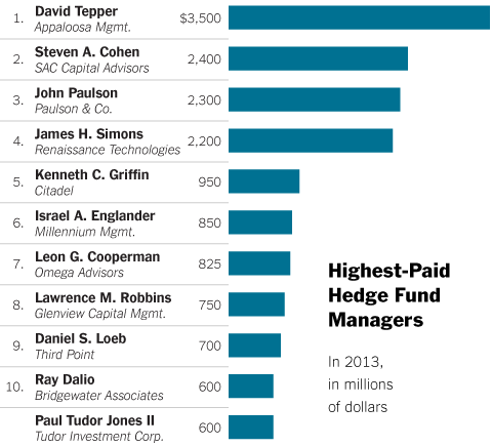
Who wouldn’t want to be a hedge fund manager?
Enormous pay packages. Private jets. Ownership of sports teams. Art collections. Houses in the Hamptons and Bahamas. Check out the annual (yes, annual) pay packages at right (yes, those are in millions). Well, the fact is that despite all these perks, hedge fund managers are under immense pressure to perform, and the way that performance is often measured is a metric called ‘alpha.’
What is alpha?
Alpha is used in finance to indicate when a strategy, trader, or portfolio manager has managed to beat the market return over some period of time. Alpha is the product of active investing (as opposed to passive investing in, say an index fund) and gauges the performance of an investment or investor against a benchmark that is considered to represent the market’s movement as a whole.
So, and this is a crude approximation, if the S&P 500 returned 18.4% in 2020 (it did), and a hedge fund manager returned 20.4% over the same period, the ‘alpha’ would be the incremental 2.0%.
But here’s the tricky thing about alpha – it is devilishly difficult to consistently deliver over time. Just like the roulette player who may get lucky a few times in a row, a hedge fund manager may outperform the benchmark (e.g., deliver lots of alpha) for a few years, but it is extremely unlikely that they will do so consistently, year after year. Though he is technically no longer a hedge fund manager, there is only one Warren Buffet for a reason, and even he looks human of late.
Why? The efficiency of markets, as described in the efficient market hypothesis, is hotly debated and beyond the scope of this post but essentially it comes down to two factors: 1) it’s very hard to predict the future and active investing is essentially a prediction, and 2) financial markets are extremely competitive, filled with smart people searching for alpha; if one strategy or approach is successful, many investors will rush in and compete away the profits.
So what does this have to do with today’s digital brand marketers?
Think of it this way: a brand marketer’s performance is typically measured in terms of brand growth, which is driven by brand awareness, trial and repeat purchase. And given that marketing budgets are limited for the vast majority of companies, the ‘alpha’ delivered by one marketer over the average marketer, is the degree to which that marketer delivers ‘brand growth per marketing dollar’ more effectively and efficiently than the average.
And just like with financial markets, there are many smart marketers out there competing for a finite amount of consumer attention. As soon as one brand identifies something that really works (e.g., Facebook look-alikes, Google Ad Words, Instagram influencers, Tik Tok…) other brands rush in with their marketing budgets. Very quickly this causes advertising costs to rise, conversion rates to fall (as the consumer becomes more skeptical) and the ROI (or alpha) to be competed away, meaning that all marketers need to begin the search for the next cost-effective opportunity. Just like their hedge fund brethren, they are constantly searching for alpha.
So what are the implications of this for how smart marketers should be thinking about their budgets and digital marketing activities? That will be the focus of my next post…
